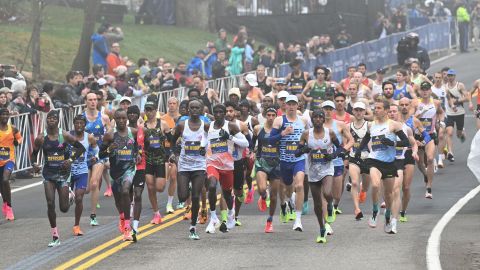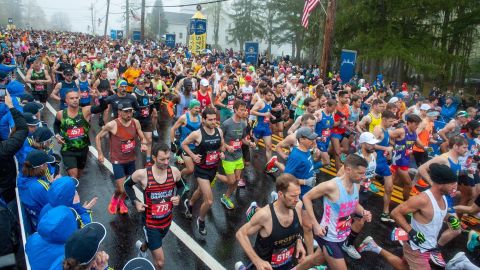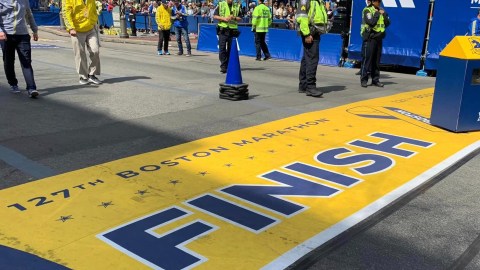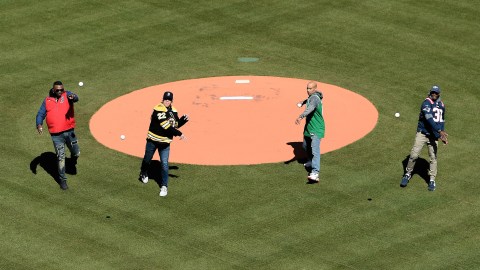 On Monday, runners from around the world will descend on Hopkinton, Mass., for the 117th running of the nation’s oldest and most famous race — the Boston Marathon.
On Monday, runners from around the world will descend on Hopkinton, Mass., for the 117th running of the nation’s oldest and most famous race — the Boston Marathon.
A total of 21,616 marathoners representing 55 states and 86 countries conquered Heartbreak Hill and crossed the Commonwealth Ave finish line last year. And while the vast majority came nowhere near Wesley Korir‘s winning time of 2:12:40, just being able to finish the 26.2-mile trek takes a tremendous amount of training and preparation.
If running in the 2013 edition seems like a cool idea to you, well, you’re far, far too late. Sure, there are bound to be a number of unregistered racers dressed up as Santa Claus or Elvis Presley, but all those looking to run with an official number must have met the qualifying standards in a previous marathon (ranging from 3:05:00 for men ages 18-34 to 5:25:00 for women over 80) within the last 18 months.
Most everyone competing on Monday has been full training mode for months, but the preparations over the final few day can make or break a race. Runner’s World magazine editor Tish Hamilton — who will be running in her 10th Boston Marathon this year — joined NESN.com to break down the steps every marathoner should take in the days and hours immediately before and after the big race to maximize their performance.
1. Embrace the taper
“Anybody who is running the marathon at this point, their training is completely done,” Hamilton says. “Really what they’re doing now is resting and really dialing it back, getting off their feet and just running a little bit so you maintain that kind of muscle memory and you don’t feel like too much of a slug.”
2. Fuel up
“Back in the old days we used to do thing thing called ‘carbo-loading,’ where you would eat lots and lots of pasta. That theory has kind of gone out a little bit. … But you do need to get carbs into your muscles. Eat what you normally eat, but just include more carbs. So if you have your salad for lunch, you’ll have a roll with that, or if you usually have an english muffin for breakfast, maybe you’ll have a bagel for breakfast. You’re just having slightly more carbs.”
3. Hydrate (but don’t over-hydrate)
“This is tricky because you don’t want to overdo it. You don’t want to drink so much water that you create an electrolyte imbalance. I know that sounds really technical, but basically what you want to to is drink to your thirst. You want to stay hydrated in the days before the marathon, leading up to the race and also during the race. You don’t want to ever think, ‘Oh my gosh, I’m so thirsty. I have to drink.’ But you also don’t want to drink so much that you have to run to the bathroom all the time.”
4. Don’t be the life of the party
“Getting rest is really important in this last week, getting as much sleep as you can at night. That usually means trying to go to bed earlier rather than sleeping in, because everyone has a life and has to get going [in the morning]. … The night before the marathon, it’s really hard to sleep because you’re all anxious and amped up and worried about what’s going to happen the next day. We always tell people, don’t worry if you can’t sleep well that night before, just make sure you’ve been sleeping well all week. Don’t go out partying all night.”
5. Be sure to adjust
“The Boston Marathon is very unique in that it starts a little later than other marathons (between 9 and 10:40 a.m.). Most people, when they’re practicing their long runs, they get up early in the morning so they can get in out of the way and then get on with their lives.”
6. Slow and steady
“When the race finally, finally starts, it’s so tempting to go out way too fast because you’re so anxious. And the Boston Marathon stats on a down hill. This is a classic mistake that everyone makes, from beginners to elites. It’s really, really important to not go out fast. That first mile should feel slow, and you use that mile as your warm-up mile. … It’s 26 miles. You’re going to be out there for a long time. If you run that first mile too fast, you’re burning up all your energy too early, and you’re going to hit the wall earlier than you want to hit the wall.”
7. You’re not done yet
“The most important thing you can do when you cross the finish line is to keep moving. That sounds like torture, but it’s really important not to stop, not to sit down. Just keep walking, even if it’s just like a shuffle, just keep moving along. … Maybe get some water, maybe get a banana, but keep moving. … The very first thing I do when I get my gear [from the buses is change out of my wet clothes and put on dry clothes. The weather forecast is looking good for runners, but the thing is, you get really hot. Then as soon as you stop, your body temperature drops, so you can get cold really quickly.”
8. Smoothie time
“It’s really important, if you haven’t eaten, to refuel with quick food. And some people have trouble [with that]. It’s the cruel irony of long-distance running. You burn all these calories and you think you’re going to be starving afterward, but sometimes your stomach isn’t too happy about food, so sometimes it’s hard to eat. A really good solution to that is a smoothie. You get hydrated, you get protein, you get carbohydrates. And as soon as your stomach is ready to have a full meal, then do that.”
Photo via Facebook/The Boston Marathon




